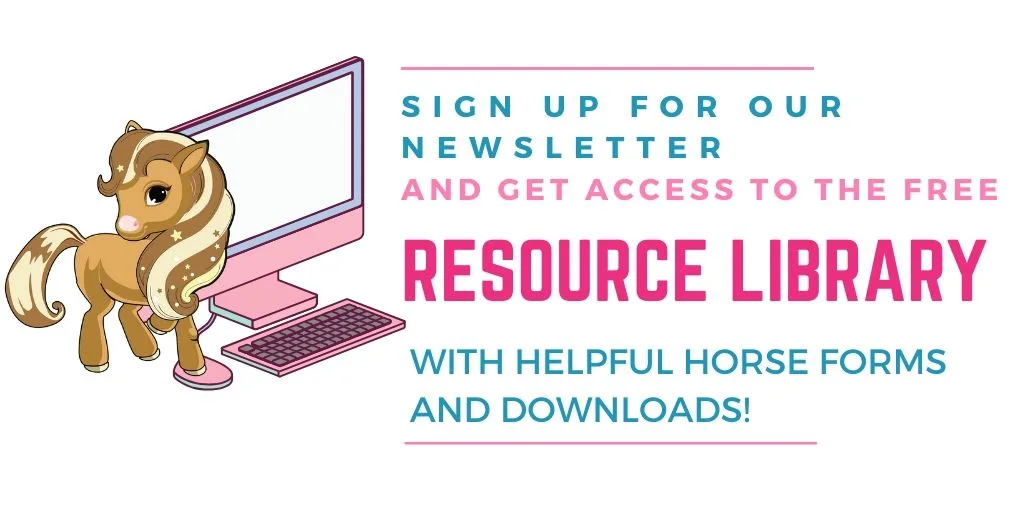Do you know exactly when a horse is considered to be a senior? If you don’t, welcome to the club! Thanks to advances in science and equine products available to us, horses today are living longer than they ever have before. Deciding whether a horse is a senior is no longer as simple as it used to be.
Table of Contents
When Is A Horse Considered A Senior?
Horses can be classified as a senior by either age or a decline in physical condition. According to Iowa State University, a horse is considered a senior at the age of 20. A 15 year old horse showing signs of aging could also be deemed a senior horse.
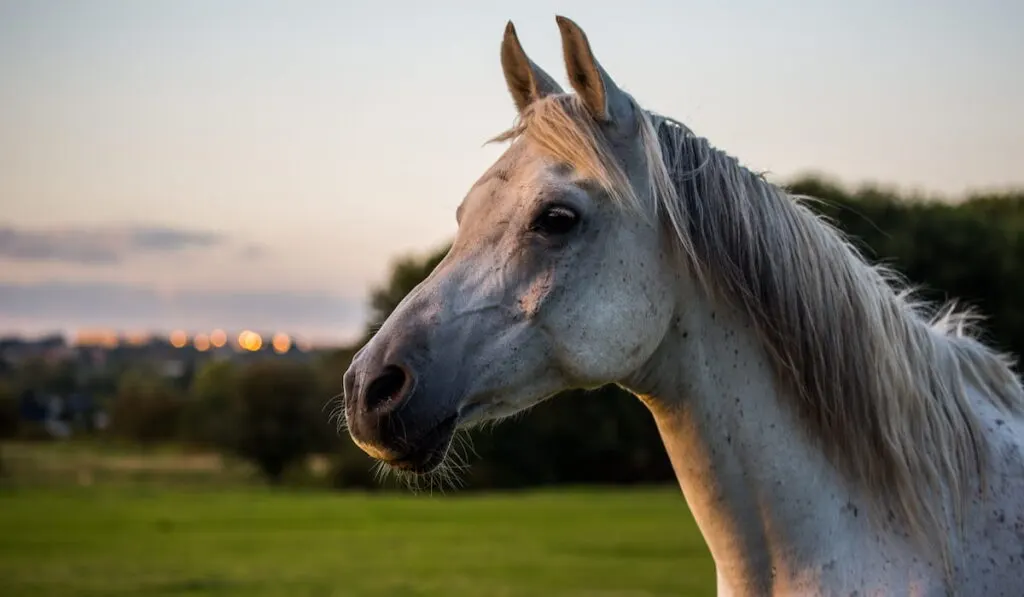
Just because your horse reaches a certain age, it doesn’t necessarily mean that they are considered a senior. The same rule applies in reverse – just because your horse isn’t 20 yet, doesn’t necessarily mean that they are not considered a senior.
Some horses’ health begins to decline more rapidly than others, and they may reach senior-hood a lot quicker than others.
How Does Age and Physical Condition Factor In?
If your horse is over the age of 15, appears to be in perfect physical health and showing no real signs of aging, then it would not considered a senior horse.
As long as they continue to maintain their weight, digest food easily, and walk without any issues, you do not technically have to consider them to be a senior horse.
Once your horse begins to show the normal signs of aging you can start referring to and treating them like seniors.
If, however, the opposite rings true, and your horse is 15 or older and is suffering from digestive issues or lameness of some kind, then you may need to consult with a vet.
If the issue is chronic, then you can think of your horse as a senior and care for it accordingly. Thankfully, there are many products available to help your horse ease into their senior lives gracefully and with little pain. (source)
Some researchers recommend 20 as the start of a horse’s golden years, but others recommend around 18-20 as a baseline. (source)
There is no specific senior age for all horses and you should never peg your horse as a senior based solely on age.
You may get lucky and your horse may not show any signs of aging until well into their twenties and that is great! You may also have a horse that ages far more rapidly, and that it okay too.
Is Senior Status the Same for Miniature Horses and Ponies?
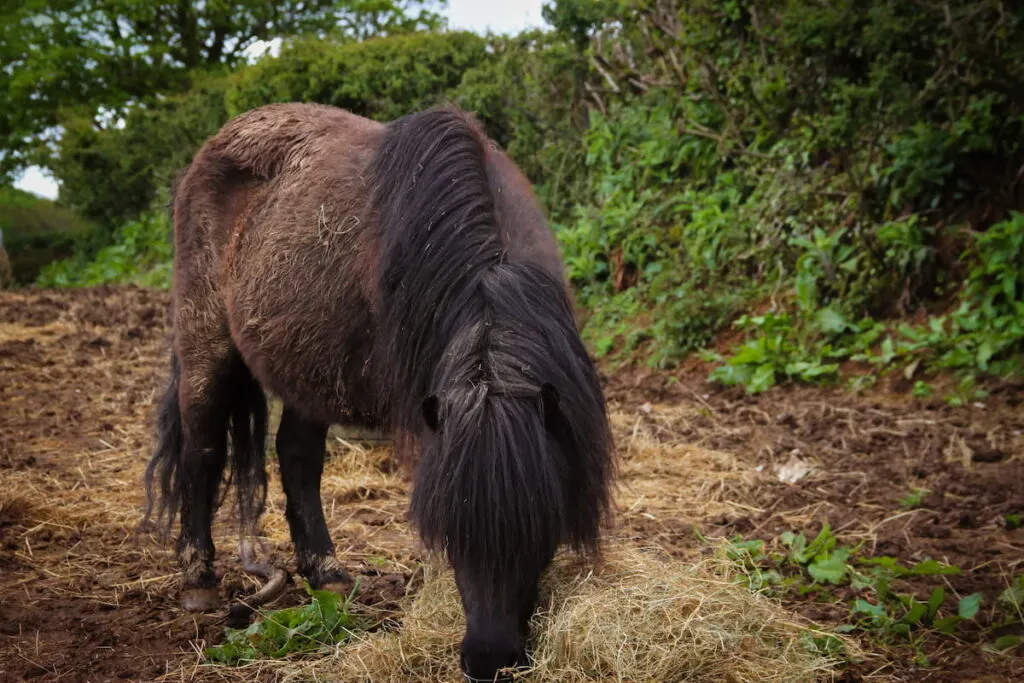
Ponies tend to have lifespans similar to that of horses, but often ponies can live well past the average age for horses. Horses typically live between 25-30 years. If everything goes well, ponies can outlive a horse by a number of years – even well into their thirties. Miniature horses can live even longer than ponies.
Ponies’ and minis’ small size can result in some complications like laminitis that can shorten their lives unexpectedly, but senior miniature horses can live up to 35 years. (source)
This means that ponies and especially miniature horses tend to reach their senior years later than normal-sized horses.
The same rule of thought rings true with ponies and minis as with horses, you should consider age along with their physical condition to determine whether they are in fact seniors.
How to Prepare Your Horse for Its Senior Years?
To help extend their pre-senior years, horse owners should keep their horses as healthy as possible. Providing the best care along with the best feed will help set your horse up for a long and healthy life.
Every illness and injury will speed up the aging process and cause horses to become seniors far earlier than anticipated.
Just because your horse ages quickly though, don’t blame yourself. There are many genetic aspects that are outside our control. What we can control, however, is what our horses eat and how they live.
Do your best to prevent injuries when you can and try to give your horses the supplements that they need throughout their lives to help them down the trail.
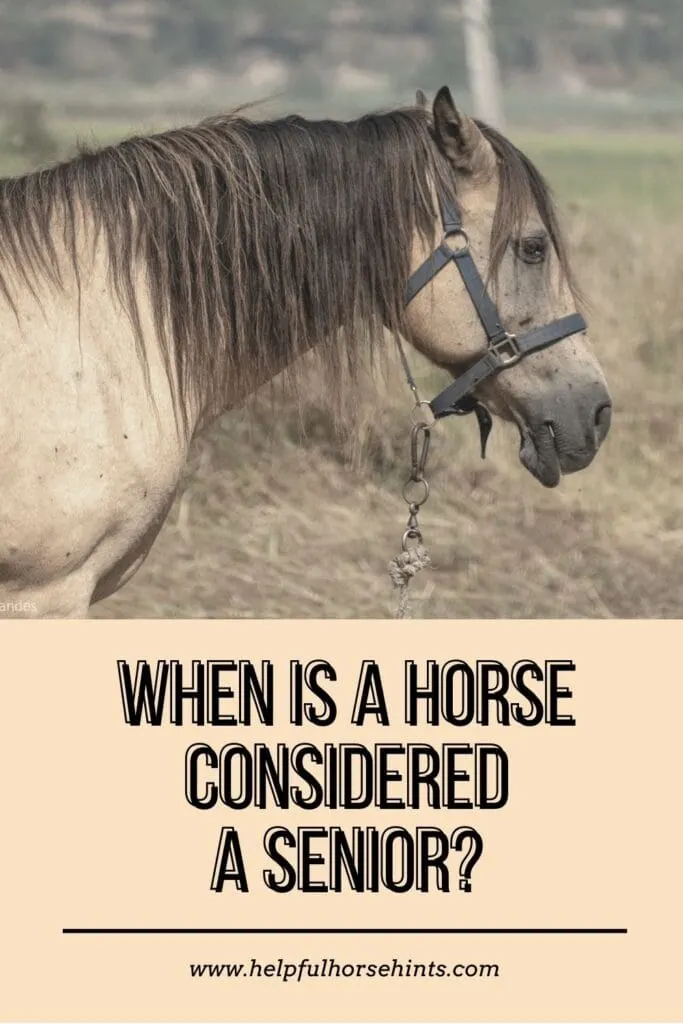
Senior Horse Issues
As your horse reaches its twenties, start keeping a lookout for signs of aging.
The first signs that a horse is getting older will probably be gray hair and whiskers showing up on their nose. This is no cause for concern, but it does indicate that your horse is getting closer to its golden years.
Musculoskeletal Problems
You should also start to look out for musculoskeletal problems that may begin to affect your horse over time. Arthritis is a common disorder that can affect older horses.
Colic
Colic, a severe intestinal problem that can lead to death, is another issue with older horses to keep a watch out for.
Dental Issues
Dental issues will also begin to affect aging horses. You should check your horse’s teeth often, especially if they are having issues eating.
Medical Issues
Cushing’s disease is another common issue seen in senior horses.
If a horse is suffering from Cushing’s, also known as PPID, they will take longer to shed their winter coats, they may suffer from laminitis and other infections, and they will lose muscle tone.
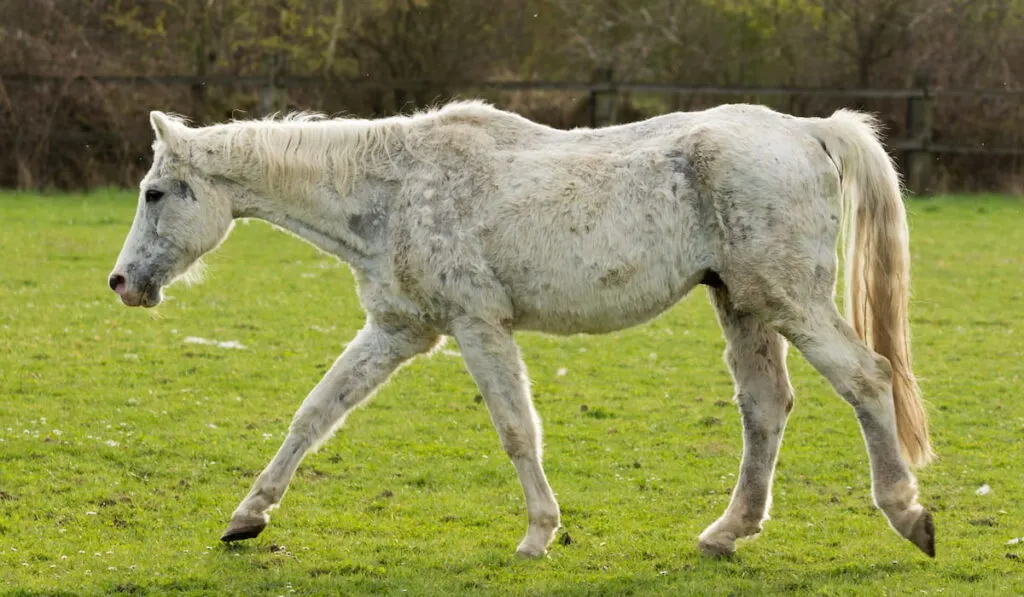
Eye Issues
Just as with humans, senior horses are more prone to eye disease and issues. Cataracts are one of the most common age-related eye issues but there are others as well. Your equine vet will be sure to look at your horses eyes during the annual health exam.
If you notice any of these issues, you should consult a vet immediately. Each of these issues will indicate that your older horse is reaching or entering its senior age. (source)
Things to Look for as Your Horse Ages
There are several signs that can tell you that your horse is becoming a senior. Some things to watch for include:
- Arthritis and problems walking or getting up
- Digestive issues and weight loss
- Dental problems
- Colic and gastrointestinal issues
- Cushing’s disease
Any of these are signs that you need to think about making changes to your horse’s care to prepare for the senior years.
Caring for your Senior Horse
Once you have determined that your horse has reached its senior years, you can begin caring for them as seniors, if you haven’t already. If you notice any of the problems mentioned above, you should see a veterinarian to help devise a more specific senior care plan for your horse. If your horse is doing well, you can begin implementing new care routines. (source)
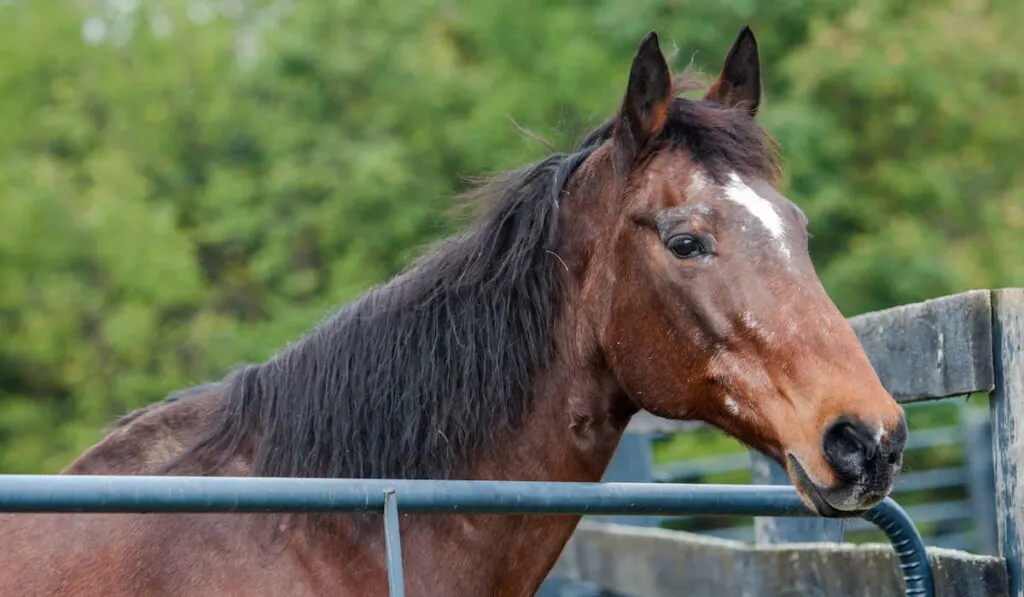
Diet
If your horse is having trouble maintaining its weight, you may need to change its diet. Some senior horses have problems chewing or digesting hay and other forage. There are some complete senior horse feeds on the market that are softer and include forage to help these horses.
There are many types of senior horse feed and supplements that can provide your older horse with extra calories, vitamins and nutrition that can help them keep their condition.
Testing for PPID/Cushing’s Disease
You can also have your horse tested for PPID, or Cushing’s Disease, just to make sure they don’t have it. PPID is a disease that is caused by an enlarged pituitary gland which results in metabolic issues.
Weight loss, late coat shedding and loss of muscle tone are all signs of PPID.
Vision Exams
Many veterinarians recommend having annual eye exams for your horse to make sure they are not having a vision problems as they age. Stumbling, spooking and restlessness may all be signs of deteriorating eyesight in your senior horse.
Supplements
Many horse owners give their horses supplements to help them get the vitamins and supplements that they are missing. Sometimes, as horses age, their bodies are unable to process all the nutrients effectively from food sources.
To help combat this issue, you can provide your horse with the nutrients they are missing. You should work with your vet to determine what nutrients they are lacking.
Be sure and check out what we think are the best senior feeds.
Parasite Control
Parasite control continues to be necessary as your horse ages. Work with your vet to determine the best worming schedule for your horse’s health.
Extra Things You Can Do To Care For Your Senior Horse
Our older horses have served us well throughout their younger years and, so, there are some things you can do to make them feel more comfortable as they age. Here are some ideas to get you started:
Horse Treats and Cookies
Almost all horses love to get horse treats and cookies, just remember to keep your horse’s dental condition in mind when feeding them. You’ll want to offer cookies that are softer and easier to chew.
Also keep in mind any pre-existing conditions your senior horse may have and adjust your horse treat and horse cookie recipes accordingly.
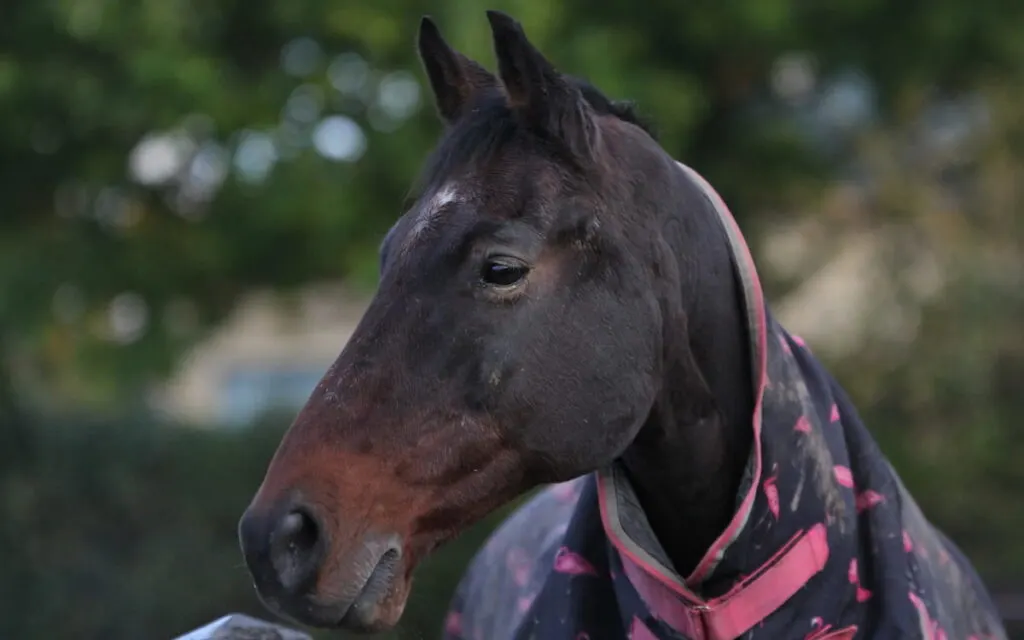
Blankets and Sheets
When it is cold out, evaluate if your older horses need a blanket or sheet. Senior feed will help them keep condition but, if your older horse is on the thin side they may not grow enough of a coat to keep them warm in winter.
Keep in mind that not all older horses need a blanket. Use your horses condition to determine if a blanket or sheet is necessary.
Final Thoughts
Just because your horse reaches a certain age, it does not necessarily mean that they are considered a senior. It does mean, however, that you should definitely start preparing for your horse’s senior years. Monitor their physical condition and watch for signs of aging.
Becoming a senior horse is not a bad thing, it just means that a new plan of care needs to be put into place to meet your horse’s changing needs. If your horse is already a senior, be sure to implement a senior care plan if you haven’t already.

